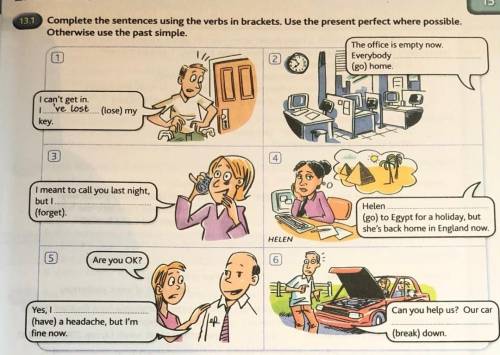Complete the sentences using the verbs in brackets. Use the present perfect where possible. Otherwise use the past simple.

Другие вопросы по теме Английский язык
Популярные вопросы
- Назовите технический прием в футболе. «Опорная нога сгибается в колене. Останавливающая...
3 - Употребите приведённые слова в Творительном падеже.Помните: под ударением...
1 - 97. Найдите в данных предложениях определения. Выпишите их вместе с опреде-...
1 - 1- корень из 3 i записать в тригонометрической форме...
3 - Баскетбол ойынындағы допты беру дағдысын дамытатын эстафетаны тап....
1 - Дан Прямоугольный параллелепипед ABCDA1B1C1D1. Найдите угол между прямыми...
3 - Какие равенства или неравенства являются высказываниями? 1)x2+y2=25.2)26-7=18.3)x+y=z.4)x...
3 - Тесты 10 вопросов и ответов в которых один из них будет правильный а два...
1 - решите уравнения :б)11 ¾-y=5 ¹⁵/34д)9 ⁵/36-х=2 ⁴/9в)7 ²⁷/44+а=18 ⁵¹/55е)к-5...
1 - составьте триады со следующими понятиями: ассимиляция, диссимиляция, фототрофы,...
3
2. I ________ (not see) that movie yet.
3. She ________ (read) three books this week.
4. They ________ (live) in London for two years.
5. We ________ (not finish) our homework yet.
1. He visited his grandparents last summer.
In this sentence, we use the past simple tense because the action of visiting his grandparents occurred at a specific time in the past.
2. I haven't seen that movie yet.
In this sentence, we use the present perfect tense because the action of seeing the movie is not tied to a specific time. It implies that the speaker still has the opportunity to see the movie in the present.
3. She has read three books this week.
In this sentence, we use the present perfect tense because the action of reading the books is not tied to a specific time. It implies that the speaker completed the action in the recent past.
4. They have lived in London for two years.
In this sentence, we use the present perfect tense because the action of living in London started in the past and continues up to the present moment.
5. We haven't finished our homework yet.
In this sentence, we use the present perfect tense because the action of finishing the homework is not tied to a specific time. It implies that the speaker still has the opportunity to finish the homework in the present.